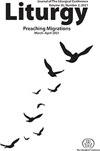Branding, Enduring Racial Logic, and Creation of Liturgical Places: Better World Logo as Heuristic Case Study
IF 0.3
0 RELIGION
引用次数: 0
Abstract
Better World, an international development NGO with UN Economic and Social Council (ECOSOC) status, helps “global neighbors suffering from poverty, disease, and disasters to make better villages around the world.” They take holistic approaches to working with locals to nurture healthy socio-economically and environmentally sustainable communities. The “village” language takes cues from Park Jeong-Hee regime’s modernization initiative “Saemaeul” (New Village) movement of the 1970s that promoted the industrialization of poverty-stricken rural villages of Korea. The NGO takes steps toward fulfilling their hope of a better world one village at a time. Partnerships with local government and village constituents unfold through the umbrella of “Clean Village,” “Healthy Village,” and “Wealthy Village” programs. According to their website, Better World has assisted 98,734 persons through their Clean Village programs that assist with waste management, fostering access to public hygiene, and developing sustainable energy solutions. The Healthy Village program aided 86,227 persons by constructing medical facilities and resourcing prevention medicine as paths toward elevating levels of public health. The Wealthy Village programming addresses housing needs, finances road, and bridge infrastructure, and provides occupational training. The sensibility of the word translated into English as “wealthy” aligns closer to “abundant” and “flourishing.” Over the course of its 10 years of existence Better World considered the people of 22 villages in 18 nations their neighbors and held them in the sightline of love. Better World NGO held its 10th Anniversary Celebration Worship Service in 2020. Preaching on the Good Samaritan story (Luke 10:33–37), Rev. Jae Hoon Lee, head pastor of Onnuri Church in Seoul, Republic of Korea, and Representative of the NGO, reiterated Jesus’ teaching regarding the nature of neighborliness. According to Lee, the scribe as well as the contemporary elites of today intellectualize the issue of extending compassion. “Who is my neighbor?” the powerful ask. Yet recognizing a neighbor in need is not a matter of proper intellectual discourse; it is a matter of the heart. Addressing those gathered to celebrate the accomplishments of Better World, Lee emphasized that those who only deliberate categories will fail to recognize another as a neighbor. In their gatekeeping, they will fail “not because they don’t know who their neighbor is, but because they lack love.” Lee continued by sharing a saying: “Love, instead of stirring our hands to action, will first open our eyes.” According to Lee, the power of love lies in the opening of perception. Lee explained that the work of the NGO would be impossible without love. It is through love that “we orient ourselves to those we don’t see, those who are—for us [Koreans]—at the ends of the earth. Of course, through photography and videos, we see them in limited ways, but without living there, there are品牌化、持久的种族逻辑和外科手术场所的创造:作为启发性案例研究的更美好世界标志
“更美好的世界”是一个具有联合国经济及社会理事会(ECOSOC)地位的国际发展非政府组织,它帮助“遭受贫困、疾病和灾害的全球邻国在世界各地建设更美好的村庄”。他们采取全面的方法与当地人合作,培育健康的社会经济和环境可持续发展的社区。“村庄”一词来源于朴正熙政权在20世纪70年代推动韩国贫困农村产业化的现代化倡议“新村运动”。这个非政府组织一步一步地实现他们对一个更美好世界的希望。通过“清洁村”、“健康村”和“富裕村”项目,与地方政府和村民建立伙伴关系。根据他们的网站,“更美好的世界”通过他们的清洁村项目帮助了98,734人,这些项目协助废物管理、促进公共卫生和发展可持续能源解决方案。健康村方案通过建设医疗设施和提供预防医学资源作为提高公共卫生水平的途径,帮助了86 227人。富村计划解决住房需求,为道路和桥梁基础设施提供资金,并提供职业培训。这个词翻译成英语的感觉是“富有的”,更接近于“丰富的”和“繁荣的”。“美好世界”成立10年来,把18个国家的22个村庄的人们当作自己的邻居,把他们放在爱的视线里。美好世界非政府组织于2020年举办了十周年庆祝敬拜仪式。在宣讲好撒玛利亚人的故事(路加福音10:33-37)时,韩国首尔Onnuri教会的首席牧师、非政府组织代表李宰勋牧师重申了耶稣关于邻里关系本质的教导。根据李的说法,今天的文士和当代精英都将同情心的扩展问题理智化了。“谁是我的邻居?”强者问道。然而,认识到一个有需要的邻居并不是一个恰当的智力话语问题;这是心灵的问题。李总统向庆祝“更美好的世界”所取得的成就的人们强调说,那些只考虑分类的人将无法认识到另一个人是邻居。在守门方面,他们会失败,“不是因为他们不知道他们的邻居是谁,而是因为他们缺乏爱。”李安还分享了一句话:“爱,不是让我们动手行动,而是首先打开我们的眼睛。”根据李,爱的力量在于知觉的开放。他解释说,没有爱,NGO的工作是不可能的。正是通过爱,“我们把自己定位于那些我们看不见的人,那些对我们(韩国人)来说在地球尽头的人。”当然,通过摄影和视频,我们以有限的方式看到它们,但没有生活在那里,它们就在那里
本文章由计算机程序翻译,如有差异,请以英文原文为准。
求助全文
约1分钟内获得全文
求助全文

 求助内容:
求助内容: 应助结果提醒方式:
应助结果提醒方式:


